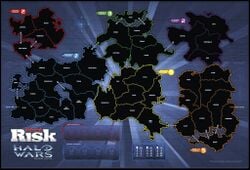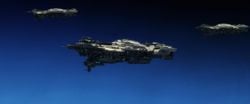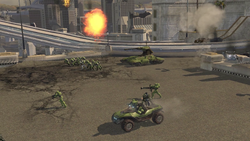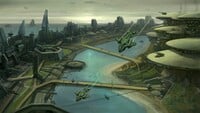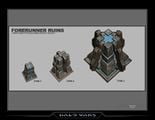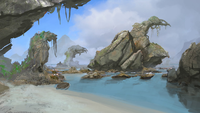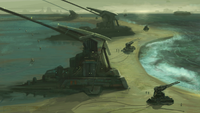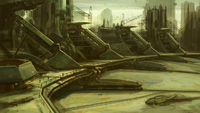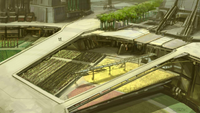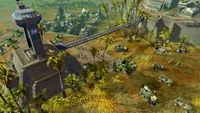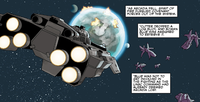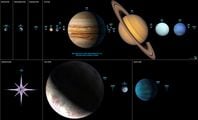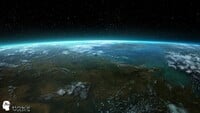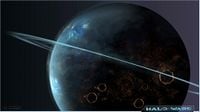Arcadia
From Halopedia, the Halo wiki
| Arcadia | |
|---|---|
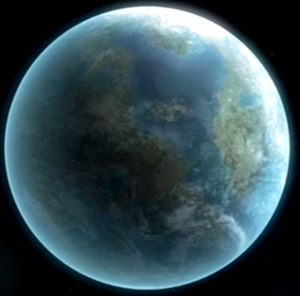
| |
| Astrographical | |
|
System: |
|
|
Orbiting: |
|
|
Orbital position: |
Fourth planet[1] |
|
Moon(s): |
|
| Physical | |
|
Diameter: |
13,019 kilometers (8,090 mi)[1] |
|
Gravity: |
1.02 G[1] |
|
Atmosphere: |
|
|
Surface temperature: |
3°C to 37°C (37°F to 98.6°F)[1] |
| Societal | |
|
Demonym: |
Arcadian[3] |
|
Species: |
|
|
Population: |
2,998,230 (formerly)[1] |
|
Colonized: |
|
|
Government: |
Unified Earth Government (formerly)[1] |
- "Arcadia colony, to be precise. Population a little under three million, largely unexplored, but apparently quite the vacation resort."
- — Serina[4]
Arcadia is the fourth planet in the Procyon system, orbited by two natural satellites—Gihon and Pishon. Colonized in 2429,[1] Arcadia was a human Outer Colony of the Unified Earth Government, home to a population of nearly three million.[4] A thriving colony,[1] Arcadia was a popular tourist destination, famed for its lush jungles and forests.[5]
On February 9, 2531, Arcadia was attacked by the Covenant, leading to a brief, yet brutal, battle between the United Nations Space Command and the Covenant.[5] Although Admiral Preston Cole successfully fought off the Covenant forces, Arcadia's major population centers were destroyed and the Arcadians abandoned their home. However, over the following years, many Arcadians slowly returned to their homeworld and began rebuilding their colony.[6]
On September 9, 2549, the Covenant returned to Arcadia and finally glassed the planet, eradicating nearly its entire population.[5]
Overview[edit]
Astronomical features[edit]
Arcadia is a tropical planet orbiting the star Procyon,[7][2]. Slightly larger in size than Earth, the planet has a diameter of 13,019 kilometers (8,090 miles). Arcadia has an approximated gravity of 1.02 G, with an average surface temperature varying from 3 °C to 37 °C (37 °F to 98.6 °F).[1] Regarded as atmospherically tropical,[7] Arcadia's oxygen-nitrogen atmosphere had an atmospheric pressure of 1.3 atm.[1]
Environmental features[edit]
Arcadia's landmasses were divided into six designated continents: Eire, Pacifica, Mu, Caledonia, Lemuria, and Avalon. Even before humans colonized the planet, Arcadia already maintained environments and natural resources suitable for human habitation, requiring no aggressive terraforming measures.[5] Arcadia's surface was largely unexplored beyond the colony's limited settlements and tourist zones, preventing the discovery of the Forerunner ruins on the planet for a long period of time.[7]
Locations[edit]
Ecology[edit]
Arcadia was once famed for its dense, lush forests and jungles that covered most of the world's surface. Some of its wild tropical plant species included small palms, ferns, and various broadleaf plants.[8] Many were visually similar to Earth species such as date palms, banana plants, and elephant ear. The swampy regions of Arcadia featured water-adapted trees with pneumatophore root structures, aquatic reeds, flowering plants, and aerial moss.[9] Orange-capped fungi have been observed.[10] Many buildings in the wilds of Arcadia, both human and Forerunner, exhibited cryptogam growth.[9] Arcadia City included vibrant flora as part of its landscaping, some of which may have been Earth-transplants, including turfgrass, multiple palm species, conifers, flowering plants, ferns, and various broadleaf plants.[4]
Frequent animal calls could be heard in the wilds of Arcadia.[8] A species of fauna known as drymanders are native to the planet, and resided in the gardens of Arcadia City.[11] The water in the jungles of Arcadia likely contains many bacteria and protists that cause disease; Cadmon Lasky contracted diarrhea after drinking a mouthful of river water.[12]
After the planet was glassed by the Covenant in September 2549, Arcadia's once-lush surface was reduced to ashen-gray slag. There were no pockets of color on the planet as the Covenant had been especially zealous in glassing the colony,[13] taking care to burn every vital part of Arcadia.[6] A pale blue atmospheric ring circled the planet, creating a spectral glow that contrasted with Arcadia's gray surface.[13]
Known residents[edit]
- Tedra Grant - SPARTAN-IV supersoldier
- Jordan Gaines - ONI operative
- Ellen Anders - Scientist
- Adam Andrews - CEO of Optican
- Dahlia
History[edit]
Ancient history[edit]
Arcadia was once a heavily populated Forerunner colony, one of the many worlds within the vast ecumene. Following the activation of the Halo Array, the remnants of the Forerunners' presence on the planet were destroyed by erosion or buried deep beneath Arcadia's surface.[7] One of the Forerunner sites on the planet was a building complex located within the jungles of the planet.[14]
Rise of humanity[edit]
Arcadia was colonized by the Unified Earth Government in 2429, where the planet was established as an Outer Colony.[1][2] The colony did not require any aggressive terraforming measures to be suitable for human habitation, as the planet had a plentiful supply of resources needed to support human settlement.[5] Several Phoenix-class colony ships were involved with the initial colonization of Arcadia, supporting the establishment of the metropolitan capital of Pirth City.[15]
The planet quickly became exploited for agricultural and recreational reasons, becoming both a farming world and a tourist destination.[5] Arcadia's surface was barely explored by its human colonists, though the Office of Naval Intelligence was aware of the Forerunner ruins hidden among the planet's dense jungles.[16] On January 16, 2498, Arcadians opened the Deep Space Research Array in the planet's orbit, with the intent to research and study extremely high-gravity events.[17]
Despite a largely peaceful history,[1] Arcadia became a brief site of conflict during the Insurrection in the mid-2520s, when insurgent activity arose in the jungles of the planet. In response, elements of the United Nations Space Command's 10th Shock Troops Battalion were deployed to Arcadia, where the Orbital Drop Shock Troopers quelled the rebel movement before redeploying to Andesia.[12][18] Around this time, Pirth City became a hotspot for refugees fleeing insurrectionist activity on Eridanus II.[19]
Human-Covenant War[edit]
Towards the end of the Harvest campaign during the Human-Covenant War, the Covenant's Fleet of Glorious Interdiction discovered Forerunner ruins on Harvest containing coordinates to Arcadia. Led by Arbiter Ripa 'Moramee, the fleet arrived at Arcadia on February 9, 2531, pursued closely by UNSC Spirit of Fire of the Third Fleet. Two Ket-pattern battlecruisers of the Covenant fleet quickly engaged the four warships of the Arcadian defense fleet. While one battlecruiser was destroyed, two of the UNSC ships were lost and the other two were heavily damaged. By the time Spirit of Fire arrived in the system, the remaining battlecruiser had begun deploying ground forces to Arcadia's surface.[4]
While Pirth was heavily assaulted by Covenant forces, the Arcadian Patrol and Spartan-II Red Team attempted to evacuate the city, with their efforts supported by forces deployed by Spirit of Fire.[4] As the battle spread across Arcadia's surface, the rest of the Fleet of Glorious Interdiction arrived over the planet.[20] However, Admiral Preston Cole and the rest of the Third Fleet arrived at Arcadia and engaged the Covenant fleet.[6] Towards the end of the battle, Covenant forces located their target—the Forerunner ruins deep within the Arcadian jungles.[1] After a protracted engagement at the ruins, 'Moramee traveled to the planet's surface and captured Ellen Anders, requiring her to further his plans at Trove. While 'Moramee left the system, he was pursued by Spirit of Fire.[14] Meanwhile, the Third Fleet succeeded in destroying the majority of the Covenant fleet and the remaining forces retreated from the system.[6]
Following the Battle for Arcadia, the planet's major population centers were destroyed and the surviving Arcadians fled their ruined homeworld. However, over the following years, many Arcadians slowly began returning to their world and rebuilding. While flora had overgrown most of their cities, the Arcadians resettled in Abaskun on Mu, a mostly lawless community that provided much needed food supplies to the UNSC and the Inner Colonies.[5][17] However, on September 9, 2549, a massive Covenant fleet returned to Arcadia and glassed the planet. The Arcadians attempted to flee aboard hundreds of transports, although only a handful successfully escaped.[6] The surviving Arcadians eventually relocated to the UEG refugee camps in the southern dunes of Terra Cimmeria on Mars.[21][22] One of the few locations spared from being glassed was the Forerunner ruins on the planet.[11]
Post-war[edit]
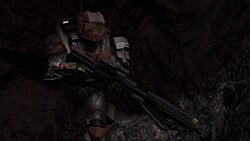
Following the Covenant War, Arcadia became the site of multiple salvage operations undertaken by Kig-Yar. The United Nations Space Command, in response, launched Operation: EASTERN AZURE, which not only involved the surveillance of these activities but also the mapping of new potential slipspace routes to and from the planet; Spartan Jameson Locke participated in this operation.[23]
In January 2557, the salvaging ship Ace of Spades passed by the glassed Arcadia on her way to the neighboring planet of Laconia, searching for the Radiant Perception which had crash landed on Laconia following the Battle for Arcadia years earlier.[13] After retrieving a log buoy from the Radiant Perception, the crew of Ace of Spades briefly hid from pursuing forces of Jul 'Mdama's Covenant remnant on the dark side of Arcadia.[24]
In 2560, Adam Andrews, who had been saved from the Covenant by John Forge and Marines from the Spirit of Fire during the Battle for Arcadia, met with Kig-Yar salvagers working for Nor Fel at the Forerunner ruins and traded the R'awuw-pattern Scarab's focus cannon for rumbledrugs. The salvagers were then ambushed and killed by Team Omega who secured the focus cannon and framed it so that the salvagers were waylaid after they had departed from Arcadia.[11]
Government[edit]
Arcadia was an Outer Colony administrated by the Unified Earth Government. The colony was divided into forty-two[25] provincial regions, the largest of which was the metropolitan capital of Pirth City,[5] located on the continent of Eire.[25] Other major cities on Arcadia included Abaskun, Arcadia City, Daylam, and Saqsin.[1] The Arcadian Patrol served as the colony's police force.[4] The United Nations Space Command maintained Fort Deen on the colony,[26] while the Office of Naval Intelligence also had their own facility in the jungles of Arcadia.[27] In early 2531, the colony had a population of 2,998,230.[1]
After the Covenant's attack, most Arcadians abandoned their homeworld, though many returned over the following years.[6] Abaskun would be resettled as a farming community[17] and habitation would continue in Arcadia City.[28] Although Abaskun was regarded as lawless[17] and anachronistic,[5] Arcadia City maintained a colonial government.[28]
Society[edit]
Like many Outer Colonies, Arcadia was exploited for its natural resources, and for recreational purposes, becoming a popular tourist destination.[5] Described as a "tourist paradise", Arcadia became famed for its safaris and other recreational amenities, with cruise ships in constant transit between the colony and Earth.[7][29] Due to the planet's fertile environment, the colony soon had a large agricultural industry, providing foodstuffs to other colonies of the Unified Earth Government.
Even after the Covenant had first attacked the planet, the remaining Arcadians at Abaskun continued to plant and grow crops for the Inner Colonies, clinging to their trade[5] and providing the United Nations Space Command with much-needed food supplies.[17]
Arcadia's high-speed rail ran on a planetary tram network.[30] Arcadia was also home to three space elevators,[1] as well as an orbital refinery complex that was destroyed during the Covenant's first attack on the colony.[6] Lethbridge Industrial also maintained facilities on Arcadia, one of which held design files for the corporation's own variant of the HRUNTING Mark III (B) Cyclops.[31] Among other exports, the planet was known for Procyon champagne, a luxurious vintage favored by Robert Watts.[32]
Culture[edit]
The Arcadians were regarded as a peaceful and thriving people.[1] The colony's inhabitants had only explored a relatively small portion of the planet; the creation of the Deep Space Research Array in Arcadia's orbit led some to point out the irony that the Arcadians knew more about the galaxy than about the dense forests and jungles of their own planet. The population appeared to be loyal to the Unified Earth Government, providing the Inner Colonies with much-needed foodstuff even after their civilization had fallen into a bizarre state of anarchy and lawlessness, following the Covenant's first attack on Arcadia.[5] The Arcadians had their own style of fashion, unique to their world.[33]
Production notes[edit]

|
Browse more images in this article's gallery page. |
Arcadia was first mentioned in Halo: Contact Harvest, written by Joseph Staten in 2007. The colony later appeared in Halo Wars as a setting for four campaign levels in the game. The original idea for Arcadia was pitched to Staten by Graeme Devine, the lead designer of Halo Wars. Staten liked the idea so much that he mentioned it in his novel Contact Harvest.[34] Arcadia is also the setting for the RISK: Halo Wars Collector's Edition board game.[25]
In the Halo Encyclopedia (2009 edition), Arcadia is erroneously referred to as an Inner Colony.[7] Halo: The Essential Visual Guide also uses an image of Harvest to depict Arcadia.[1]
Gallery[edit]
Concept art of Sergeant Forge observing Forerunner ruins on Arcadia for Halo Wars.
List of appearances[edit]
- Halo: Contact Harvest (First mentioned)
- Halo Wars (First appearance)
- Halo Legends
- Halo: Reach
- Dr. Halsey's personal journal (Mentioned only)
- Halo 4: Forward Unto Dawn
- Halo: Escalation
- Halo 5: Guardians (Mentioned only)
- Limited Edition dossiers (Mentioned only)
- Halo Mythos
- Halo: Fractures
- Oasis (Mentioned only)
- Halo: Smoke and Shadow
- Halo Wars 2 (Mentioned only)
- Halo: Envoy (Mentioned only)
- Halo Infinite (Mentioned only)
- Halo: Hippocratica
Sources[edit]
- ^ a b c d e f g h i j k l m n o p q r s t u v w x Halo: The Essential Visual Guide, page 12
- ^ a b c d e Halo Encyclopedia (2022 edition), page 50
- ^ Halo: The Art of Building Worlds, page 166
- ^ a b c d e f Halo Wars, campaign level Arcadia City
- ^ a b c d e f g h i j k l Halo Waypoint, Arcadia (Retrieved on Oct 8, 2011) [archive]
- ^ a b c d e f g Halo: Reach, Dr. Halsey's personal journal
- ^ a b c d e f Halo Encyclopedia (2011 edition), page 298
- ^ a b Halo Wars, campaign level Arcadia Outskirts
- ^ a b Halo Wars, campaign level Dome of Light
- ^ Halo Wars, multiplayer map Pirth Outskirts
- ^ a b c d Halo: Hippocratica
- ^ a b Halo 4: Forward Unto Dawn: Part 2
- ^ a b c Halo: Smoke and Shadow, page 71-72
- ^ a b Halo Wars, campaign level Scarab
- ^ Halo Legends: Origins
- ^ Data Drop #4
- ^ a b c d e Halo Wars: Timeline Events
- ^ Halo Waypoint: Cadmon Lasky
- ^ Hunt the Truth
- ^ Halo: Escalation: Issue 5
- ^ Halo: Fractures - Oasis
- ^ Halo: Envoy, page 73
- ^ Halo 5: Guardians Limited Edition, Dossier files - Jameson Locke
- ^ Halo: Smoke and Shadow, page 106
- ^ a b c Risk
- ^ Halo Wars, multiplayer map Fort Deen
- ^ Halo Wars, campaign level Dome of Light
- ^ a b Halo Waypoint, Jordan Gaines (Retrieved on Jun 1, 2020) [archive]
- ^ Halo: Contact Harvest, page 127
- ^ Halo Wars, campaign level Arcadia City: Tram System Station - Console description "A planetary network of high-speed rails, the Arcadian tram system was heavily damaged in the initial Covenant assault. Intact tram stations are serving as temporary shelters for evacuating refugees."
- ^ Halo Wars 2: Phoenix Log: Cyclops
- ^ Halo: The Fall of Reach, page 104 (2010)
- ^ Halo: The Essential Visual Guide, page 8
- ^ Kotaku: Halo Wars Playable, But Not Here
